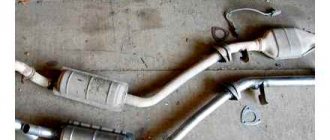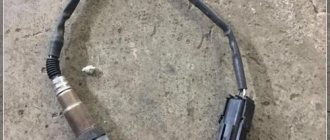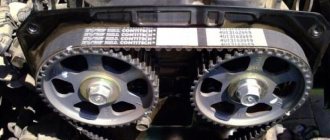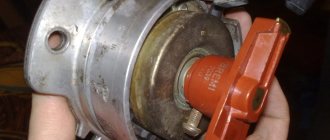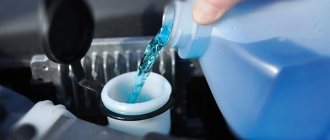What is the purpose of the catalyst, when can it be cut out, what are the consequences of removal and what will happen if you drive a car without a catalyst - we tell you.
- What is an autocatalyst
- Why do you need a catalyst in a car?
- Is it possible to remove the catalyst from a car?
- When is it time to cut out the car?
- How to drive a car after cutting out a car
- Consequences of catalyst removal
What is a catalyst
The catalyst is a necessary component of the combustion product removal system of the fuel-air mixture in a car. The functioning of the element is based on a chemical reaction to neutralize heavy particles and dangerous gases. Exhaust gases from such vehicles do not increase smog levels in the city.
You can find this element in the exhaust system line. It is placed as close to the intake manifold as possible. This is done because the reaction only takes place at high temperature. The efficiency of the device is ensured by the fact that the gases at the outlet of the engine have the highest temperature.
Theoretical part
Automotive catalyst device
The exhaust gas coming out of the cylinders of the power unit consists of many elements released as a result of a chemical reaction, which is combustion. Some of these elements are quite harmless, but such as carbon monoxide (CO), hydrocarbons (CH) and nitrogen oxides (NO and NO2) are quite dangerous. To reduce their content in engine exhaust, scientists decided to once again subject these chemical compounds to chemicals. reactions. To do this, they had to use expensive metals - platinum-iridium alloy, palladium, rhodium. By reacting with them, harmful chemical elements are oxidized, which is why after the reaction the output is carbon dioxide (CO2) and nitrogen (N2) - completely harmless substances. Of course, the catalyst is not capable of removing completely toxic elements, but it is quite possible to significantly reduce them.
Even EURO standards, which are constantly being tightened, imply a certain presence of hazardous substances that cars must not exceed. In some countries, the environment is monitored very seriously, so cars that do not meet certain EURO standards and are not equipped with catalysts are prohibited from being sold or used.
A few words about metals that act as neutralizers. They differ in their chemical reaction with harmful substances. Thus, palladium and platinum-based alloy are oxidizing, that is, when they react with harmful substances, they oxidize them, separating them into harmless substances.
Rhodium is a reducing neutralizer. When reacting, it reduces nitrogen oxides to ordinary harmless nitrogen.
In reality, everything happens like this: exhaust gases from the exhaust manifold are fed into a container where there is a special reel with a neutralizing metal, passing through which, some of the harmful substances are chemically neutralized, and then the exhaust gas goes further - into the resonator and muffler.
Nowadays, all three metals are increasingly used in one catalyst on a car - for improved purification of exhaust gases. That is, three reels are placed one after the other inside the catalyst, each with its own metal.
Catalyst device
The catalyst or catalytic converter is made in the format of a metal flask mounted after the downpipe. The internal space is filled with a ceramic insert with a cell-shaped structure. They look like a honeycomb. A hexagon is the optimal shape for distributing multiple partitions in contact with the gas supplied from the internal combustion engine.
Ceramic fins are alloyed using precious metals such as platinum, gold or iridium. These alloys react with hot gases present in the engine exhaust. The speed of the process depends on the heating inside the catalyst: the hotter the fins, the more efficient the conversion of nitrogen and hydrocarbon compounds into nitrogen and carbon dioxide. To ensure full operation of the catalyst, an oxygen detector is installed in the exhaust system.
Penalties
To understand that a car does not have a catalyst, you need to use special equipment. As a rule, it is present in special technical stations. Also, the absence of this element will be visible to the traffic police representative when he registers the car. If the catalyst is not installed, the owner will receive a negative response upon registration. Any design change to the vehicle must undergo laboratory testing and receive official safety confirmation. If everything is in order, the vehicle is registered.
However, the inspector will not be able to check without special equipment whether it is a catalyst or a dummy hanging. If removal occurs after undergoing maintenance, then only a technician can establish this fact.
If the traffic police inspector determines that there is no catalyst, you will have to pay a fine of 500 rubles, since the original design has been changed. Based on the international Technical Regulations, there is clause 9.10, which states that changes to the structural elements of the exhaust system and exhaust gases are prohibited.
Catalyst malfunctions and their causes
The catalyst unit in a car can be in working, non-working or semi-working condition. For the driver, various signals can indicate the state of the element:
- Reduced engine efficiency. If the engine has lost power, the car accelerates less, and the dynamic performance has decreased, then you should contact a specialist. Such symptoms are sometimes harbingers of problems with other components of the car. In the event of a critical breakdown of the converter, the engine starts poorly and regularly stalls. This is due to the occurrence of high resistance in the exhaust manifold, due to which the quality of cylinder ventilation decreases and a new portion of VTS appears.
- The car consumes more fuel. This is due to the control unit's attempts to correct the problem by supplying a richer fuel-air mixture to stabilize the crankshaft speed.
- There is a lot of noise coming from the exhaust system. Some people confuse this noise with a muffler burnout. This is a sign of the beginning of the destruction of the active elements inside the catalyst. The pieces fall off and move quickly in the can body as they are not removed along with the exhaust, making loud noises due to the impacts. This can be clearly heard during a cold start at high engine speeds.
- The Check light came on with the engine indicator. This is a universal signal that also indicates other malfunctions. In this case, diagnostics are required to determine the error code and identify the node that is the source of the signal. The ECU sometimes triggers an error message if it receives erroneous information from the lambda probe.
The catalyst lasts a long time. If it is properly operated and properly maintained on time, it can last as long as a car. This indicator is set by the manufacturer, and the service life of the vehicle is specified in the accompanying documentation. But the catalyst sometimes exhausts its service life much earlier.
Catalysts don't suddenly fail. This is usually a consequence of certain mistakes made by the car owner. They are usually associated with breakdowns in the ignition or fuel supply system. There is a certain amount of unburned fuel in the exhaust system, which remains in the form of carbon deposits on the fins. When it burns out in the catalyst, its elements become heated, followed by destruction. This can happen due to wear on the oil seals on the valves, resulting in not only exhaust, but also engine oil in the manifold.
All this can be prevented by periodically checking the car’s ignition system using computer diagnostics in order to eliminate errors in the engine configuration. It is not recommended to save on fuel. If the quality of the products at a gas station is questionable, then it is better not to refuel there anymore.
How to diagnose performance?
You can determine the performance of a car’s catalyst on your own or at a service center. There are three methods to check the functionality of a given node:
- Inspection of the hull. If the catalyst body is deformed, we can talk about partial or complete failure of the unit. The catalyst needs to be removed and held up to light. Certain models do not allow inspection unless the case is opened.
- Back pressure. To check, you will need a pressure gauge and an adapter tube to connect to it. The pressure gauge is mounted on the position of the lambda probe and the engine is started at 2.5-3 thousand revolutions for 15 seconds. Normal pressure parameters are 0.3-0.35 kg/cm2. If the indicator value is from 0.5 kg/cm2, we can talk about problems with the catalyst.
- Motor tester for diagnostics. This option can be implemented using specialized equipment. The device is connected to the place of the spark plugs to take readings when the engine starts.
Latest innovations in technical inspection
In March 2022, the government tightened the rules for passing technical inspection of vehicles. Therefore, specialized services began to upgrade existing equipment in order to prepare for upcoming inspections. Diagnostic cards began to be issued in electronic form. In this document, specialists must upload photographs of the car. It should display the following data:
license plate on the stand;
GPS coordinates.
Attention: in case of recorded violations, large fines were introduced, including criminal penalties. Thus, purchasing a vehicle inspection has become quite an expensive pleasure.
It is also mandatory to obtain a diagnostic card if the owner of the car has changed, a major component has been replaced, or changes have been made to a structural element. This rule only applies to cars older than 4 years.
Catalyst replacement
If the catalyst fails, service center specialists usually have three suggestions to resolve the situation:
- Remove the old one and install a new catalyst in its place. This is the simplest option, but also the most expensive. Typically, manufacturers install a specific element that exactly matches the engine parameters. Rarely is a spare part manufactured by a car manufacturer; usually third-party companies do this. If you replace the catalyst only with an original one, that is, one with a brand tag, then you can get an excellent result.
- Install a universal catalyst. This is a cheaper option and represents a compromise between quality and price. Typically, motorists prefer this approach when deciding to install a new part.
- Install a flame arrester. This option involves installing a “trick” that prevents the control unit from detecting that there is no catalyst. But this procedure has a drawback - changes occur in the operation of the engine, because the electronics adjust the operation taking into account the resistance from the converter. This negatively affects the purity of the exhaust.
Ways to solve the problem
Just checking the catalyst is not enough, because if it is clogged, the problem needs to be solved.
There are several options to troubleshoot the problem:
- Try to clean or rinse the device. This can really help, but only in case of minor blockage. If the honeycombs are melted, destroyed or completely blocked, the problem cannot be solved in this way.
- Replacement of the neutralizer with the original one. The easiest way to do it is to remove it, install a new one and that’s it. But the original analogue is very expensive, so it is not always advisable to buy it.
- Replacement with a universal neutralizer. Some companies engaged in the production of auto parts and accessories produce catalytic converters that can be installed on different cars. Such an element costs less than the original one, but you will have to “suffer” with the selection and adjustment;
- Replacing the neutralizer with a flame arrester. The easiest way to forget about the catalyst problem forever.
The flame arrester crashes into the system instead of the neutralizer and that’s it. But for the ECU to work correctly, you will have to either reflash it or use tricks. It is worth noting that you can no longer drive a car that has a flame arrester instead of a neutralizer into some European countries.
How to solve a problem with a catalytic converter is up to the car owner to decide. We told you how to check this element in different ways, and what can be done if it malfunctions.
Removing the catalyst
The catalyst is expensive because it contains precious metals. The high cost of the component becomes the main reason why most car owners with damaged catalysts decide to remove them. If you simply cut it out and place a piece of pipe in its place, the least that will happen is that the engine will constantly operate in emergency mode. Modern cars use an ECU that will not allow the car to start, as it will immediately detect this problem.
Therefore, it is recommended not to perform the procedure until consultation with specialists has been carried out.
Proper removal of the catalyst should be as follows:
- Diagnostics are carried out with the obligatory measurement of parameters recorded by the ECU when the neutralizer is in working order;
- A diagram of the correct operation of the engine with a working catalyst is formed;
- The group of contacts going from the catalyst to the control unit is disconnected so that diagnostics can be carried out again;
- A simulator is installed in place of the catalyst in the system, since it is necessary to create the appropriate resistance;
- It is determined what will be installed in place of this element: just a piece of pipe or an auxiliary resonator;
- Fake devices and other sensors are installed, or the ECU is re-flashed.
One of the important arguments in favor of installing a new catalyst is the mandatory technical inspection when crossing the border with European countries. If the part is removed and the electronics are correctly configured, the sensor brought to the exhaust pipe by a technical service employee will demonstrate a real reading.
Characteristic features of the procedure
Before starting work, it is important to take into account certain features of removing the catalyst. Once the neutralizer is removed from the system, the sensor will begin to continuously detect the error.
To solve this problem, a deceptive design is most often made. It helps separate the sensor and exhaust gases. Therefore, the end result is a higher oxygen concentration. The screwing in of the blende takes place in the place of the former sensor, and the device must be installed here. The system is characterized by stable operation, despite the fact that it has a number of nuances:
Even minimal independent intervention in the vehicle design will deprive you of further warranty service. Therefore, you should first think about what actions will be taken if the engine is faulty when a warranty case occurs;
passing official maintenance becomes impossible. Cheating the on-board computer is half the battle. The truth will be revealed when the inspection takes place at a special stand. As a result, an official ban on the operation of the vehicle will be issued. You will have to return from the inspection station using a tow truck.
As an alternative, you can reflash the electronic control unit. Then the system will accept the existing indicators as the norm. To understand this issue, you need to have specialized knowledge and appropriate software.
It is important to understand that when using re-firmware, the existing cycles in the operation of the motor will begin to be disrupted. Therefore, the operating mode will become incorrect. As a result, the resource may decrease by at least half. Accordingly, we can conclude that saving on reflashing will only bring new and considerable financial expenses.
Washing the catalyst
The catalyst is a component that cannot be repaired, and the only way to restore its functionality is to replace it with a new one. It is impossible to repair or restore a unit whose resource has been exhausted, and there is no reason to do this. This is a consumable part that must be replaced.
But if the catalyst is clogged, you can extend its service life by washing it. You can do this yourself. You can use ethanol or carburetor fluid for this. For the procedure, you should use plastic containers. The catalyst needs to be removed from the car and cleaned.
The honeycomb needs to be poured with liquid, and then the part should be wrapped in fabric and placed vertically on the container. After half an hour, you can rinse the honeycombs with hot water. Next, you need to blow it out to check the patency of the cells. If the air flows weakly, the process is repeated. When cleaning is complete, you can thoroughly dry the assembly with a hairdryer and blow with air.
So, it is not recommended to ignore even weak signs of catalyst failure. To maximize its service life, it is worth performing basic procedures, even if their price seems high.
Is it possible to drive without an expensive design?
Based on the technical regulations signed by the Russian Federation, driving without a neutralizer is illegal. It is also worth noting that a vehicle with a removed catalyst will not pass MOT. If difficulties arise with the catalyst or it fails, you need to replace it as quickly as possible. It is best to use an original neutralizer, since alternative designs fail faster and do not provide any benefit from a financial point of view. In addition, a missing or broken catalyst will result in the car owner not receiving a diagnostic card.
| Tweet |

